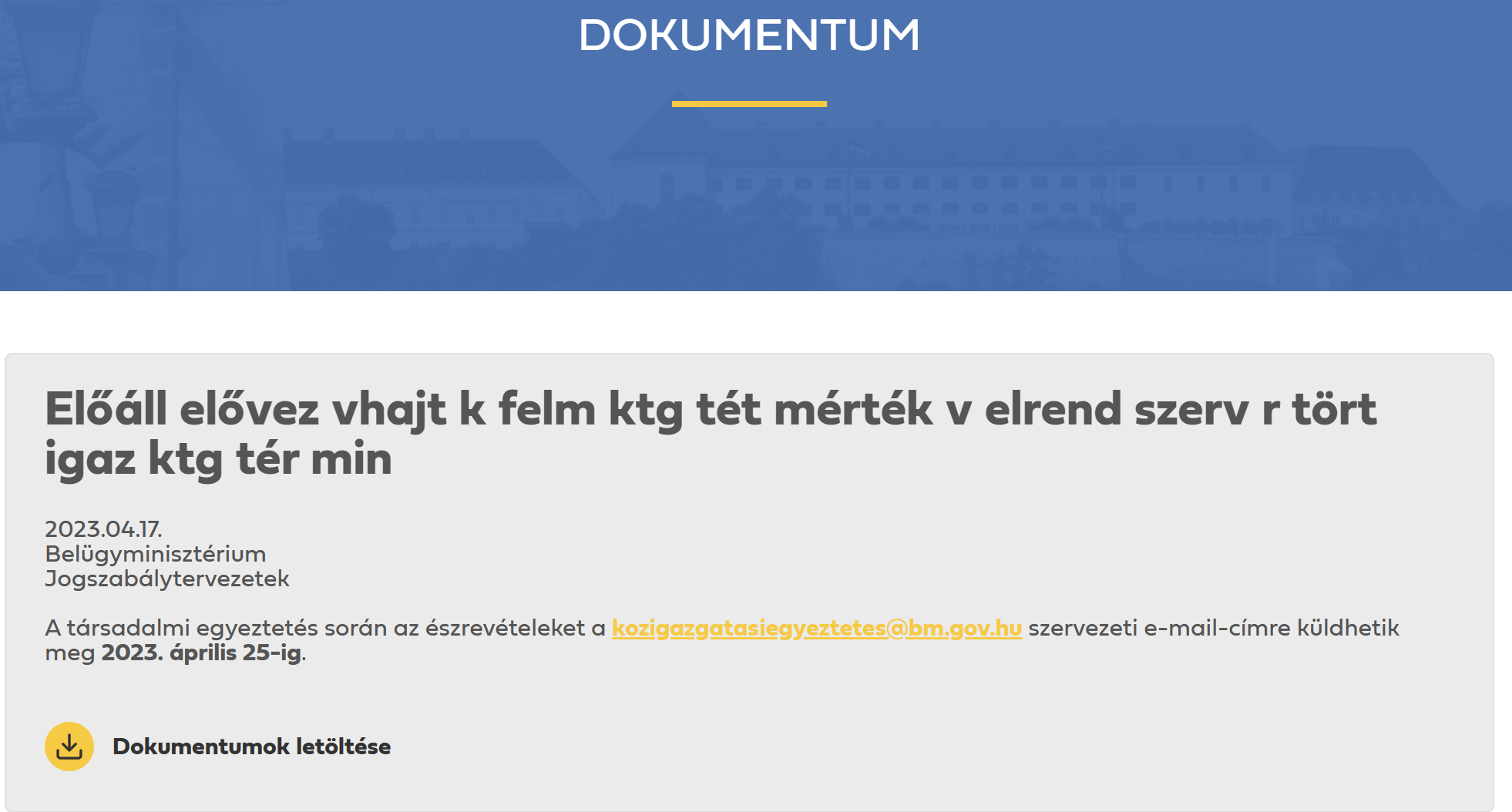Since the late 2010s, it has become a recurring criticism in Hungarian Country Reports and Rule of Law reports that the government does not have adequate and effective structures for social dialogue and stakeholder engagement. Documents of strategic importance have not been shared with the public nor with stakeholders (think of the health care reform, or the Medium-Term Anti-Corruption Strategy, which is particularly painful from our point of view), and sometimes not even with important public bodies. The bills were drafted in secret, bypassing public consultation, and many important bills were submitted to parliament as individual motions by government party MPs.
Last summer, during the course of the conditionality mechanism, one of the first announcement of the government was to introduce changes to this practice, and to amend Act CXXXI of 2010. On Public Participation in Developing Legislation (which we wrote about here).

fotó: istockphoto
Every six months, the Government Audit Office (KEHI) assesses which government departments are complying with the requirements of the Act, but in this blog post we want to dig a little deeper and see whether the fact that most (but by no means all) of the draft laws, ministerial and government decrees are now actually published on the government's website has contributed to improving social dialogue.
From October 2022 to 8 May 2023, the period under review, 463 sets of documents were published by the Government in the "Draft legislation" section of the "Document Repository". This is a remarkable figure in itself, especially as only 8 (!) packages were submitted for public consultation in the previous year and a half. These 'summary folders' often contain the new draft legislation or amendment itself, a short summary and justification , and a so-called 'impact assessment sheet', on which the initiator of the legislation has to report on the expected budgetary, social or administrative impact of the legislation. The deadline and e-mail address for sending suggestions and comments are also indicated. After the end of the public consultation, the Government usually publishes the 'result' of the public consultation in the same folder, i.e. the major concerns and opinions received, and also the government's responses (including the grounds of rejection, where appropriate). The Government publishes this summary after the submission of the bill to Parliament or after the promulgation of the legislation - but the Act CXXXI of 2010. On Public Participation in Developing Legislation does not set a deadline for this.
Few people comment - these are the reasons
Among the 463 sets of documents published in the period under review, there are 5 'privacy notices' -- not all of the ministries have published one, and it is relatively hard to find them among the documents uploaded en masse -- which is all the more problematic, as the names of the reviewers and their opinions are published on the Government's website in the absence of their objections.
In addition, the Government's legislative plan for the first half of 2023 has been published among the draft laws, as well as the the concept of the Architecture Act published by Ministry of Construction and Transport. Two additional major strategic documents were uploaded: the National Active Tourism Strategy and the National Cycling Strategy. In both cases, the Prime Minister's Office has granted a relatively long time period (35 and 38 days respectively) for the submission of opinions and comments, in stark contrast to the usual 8-day deadline for comments on other documents.
On 9 May, only 292 summaries of the results of the public consultation were available on website -- this is mainly due to the fact that drafts published in May and April have not yet been adopted.
Only 29% (84) of the draft legislations received any substantive comments at all. This can partially be explained by the subject matter of the consultations themselves: for example, between December and January, several ministries submitted for consultation draft pieces of legislation which, in accordance with the eleventh amendment to the Fundamental Law, simply consisted of changing the word 'county' [megye] to the term used for the county as an administrative district before 1949 ['vármegye', literally 'castle county', however, official English translation remains county] throughout the legislation.
Similarly technical are the amendments to Decree 1/2022 (26 May 2002) of the Ministry of Economic Development, which specify the superior state bodies of the state-owned companies. Proposed amendments to this one regulation have been submitted for public consultation 12 times (!) in the last six months - no wonder that only one of these has received substantive comments. 22 international conventions or cross-border cooperation agreements (e.g. between the EU and Malaysia) have also been subject to public consultation -- the only ones receiving comments are the Swedish and Finnish accession to NATO. Meanwhile, some proposals which might have been of considerable interest (such as legislation to curtail the powers of the medical chamber or legislation on the whistleblower protection system) were not subject to public consultation
In many cases, the very way in which draft legislation was published could not have contributed to encouraging citizens to participate and comment.
Most striking in this respect are the titles of the 'packages' posted on the Government's website: they often do not reflect effectively the subject of the public consultation. In 36% of the cases only the number of the Act or Decree to be amended were published. Different ministries tend to have different practices, for example, in the case of drafts submitted for consultation by the Ministry of the Interior, it is often the case that the subject of the consultation is indicated by abbreviations, but this is clearly not a user-friendly solution.
Even greater commitment is needed from the citizens when the published title of the draft does not even hint at its subject (e.g. 'Amendments to certain government regulations') or the description is so approximate that it requires the user to conduct detective work to find out what the social consultation is about. Even among these, the draft uploaded by the Ministry of Foreign Affairs and Trade stands out due to its deceptive nature: while its title ('Amendments to government decrees on certain investment-related matters') is not revealing, neither the summary nor the explanatory memorandum mentions that the proposal concerns a matter of considerable public interest: the case of the new battery plants in Debrecen and Ivácsa.

Tresspassers W -- the abbrevating practice of the Ministry of Interior does little to encourage citizens and stakeholders to participate in public consultation
What are people interested in?
The picture is very varied when we look at the issues that have generated the most intense interest. Despite the fact that, as we have shown above, the draft amendment to the regulatory issues concerning the battery plants in Debrecen and Iváncsa was apparently tried to be kept under the radar by the Ministry, 279 individuals sent comments or suggestions (including calls for a local referendum) on this draft in February 2023.
The proposal to amend certain health-related ministerial decrees has also attracted a lot of interest in professional circles, with 244 private individuals (the vast majority of them doctors and dentists) submitting their opinions. The Association of General Pediatricians, the Hungarian Chamber of Health Care Professionals, the Hungarian Chamber of Pharmacists, the Hungarian Medical Chamber (Regional Organisation of Dentists) and the Association of Psychotherapy Councils have also commented on the proposal. A similarly wide range of opinions was received on the draft government decrees on health and health insurance, which received 132 comments from mainly professional individuals, in addition to professional organisations, while the draft ministerial decreeon the 'Indicator-based performance evaluation of general practitioners and dentists' received 115 responses. The similar number of respondents suggest that participation in the public consultation was also encouraged in professional fora outside the Government. The three draft laws were published simultaneously, on 16 December 2022, with a deadline for comments until 24 December.
Although Gergely Gulyás, Minister of Prime Minister’s Office also stated that there was no particular point in holding a public consultation on the Swedish and Finnish NATO membership, the Government delayed the submission of the ratification to Parliament citing the ongoing consultation. These were the first two draft laws to be posted on the Government's website in October. At the same time, a handful of citizens (69 in the case of Finnish NATO membership and 60 in the case of Swedish membership) felt it important to send their views directly to the Government.
The regulation on labelling of foodstuffs containing insect proteins attracted a more modest but still significant interest: 31 people expressed their views (here, opinions were not at all aligned: while 13 were in favour of a total ban on the sale of foodstuffs containing insect proteins, many were in favour of a less conspicuous label).
The Government's proposal to extend the state of emergency on the grounds of the war in Ukraine has also triggered some interest: 24 people commented on the draft, all of them arguing against the extension of the state of emergency.
A few sectoral bills have also been commented by more than a dozen of people: the legislation on the amendment of vocational training received opinions from a significant number of stakeholders and individuals (21 in total), while 16 interested parties expressed their views on another package on health and health insurance and pharmaceuticals.
The draft amendment to the so-called "Judiciary Bill" also received 14 comments. This omnibus bill, by the way, deals with a wide range of issues, from arbitration courts to copyright law, although not a word is said about them in the brief summary of the draft. More than 10 parties have also signalled their opposition to the environmental product charge, internal controls in public finances and the judicial package linked to the recovery fund.
The other end of the list is also revealing: of the 84 drafts for which substantive comments were received, in almost half of the cases (42 drafts) only one person or organisation expressed an opinion. This is all the more remarkably low because in 20 of these 42 cases, the one and only commenter was the very same, very active individual (Hajnalka Kertész).
Who is commenting?
Around 893 individual natural or legal persons participated in the public consultations examined. The vast majority of them (87%) are private individuals, and many of them (37% in total) also indicated their professional, civil or business affiliations. A further 8% of the respondents were considered to be professional/sectoral NGOs or interest groups, and 2% were profit-oriented companies (e.g. MOL, Huawei and Granite Bank). Interestingly, public bodies such as the the central bank of Hungary and the Public Procurement Authority were also among the commentators.
The most active commenter according to published data was one individual, Hajnalka Kertész, who made a total of 88 different suggestions or opinions in 35 of the 84 public consultations -- all but one of which were rejected. She was followed well behind by the Hungarian Medical Chamber (Regional Chamber of Dentists), the Hungarian Chamber of Pharmacists and the Hungarian Helsinki Committee, with 4-4 opinions on draft legislation. 80% of the respondents made a proposal on only one piece of legislation.
What will the Government do with the proposals received during the public consultation?
In short, it rejects them.
The ministries group together, on a consultation-by-consultation basis, the "most frequently occurring, substantively related significant comments' and provide a brief reply explaining the technical or legal reasons for rejecting them. These justifications are based on a pre-drafted template and the Government is not legally obliged to provide more detailed information than this.
A total of 471 different proposals and comments were received in the 82 consultations examined, of which 434 (92%) were rejected. As some of the opinions expressed the support of the draft, in only ten cases did the government explicitly say that it would include the proposal in the draft (2%).
The most typical reason for rejection, despite the varied template wording, can be broadly summarised as 'no because the Government does not want it' - sometimes labelled 'not in line with Government policy', sometimes 'amendment not necessary', sometimes 'contrary to the purpose of the legislation'. This rejection came, for example, at the suggestion of K-Monitor when, in setting up the National Event Management Agency, we proposed that the state agency organising major sport events should be required to publish their impact assessments and cost plans. In another attempt, on the draft of the public construction law, that presumably received many proposals we have sent a 7-page proposal, but the ministry did not publish a final summary, even though the law is already before Parliament. Our proposals were not, of course, incorporated into the legislation, which was submitted essentially unchanged.
Formally, the government may have fulfilled its commitments, but in practice, it seems that it cannot get a proper grip on this institution. While the number of consultations has multiplied, there is no capacity for genuine social partnership and there still seems to be little interest in the views of stakeholders. This is also borne out by the way consultations are published: draft legislation appears on the website in bulk, in an opaque structure, and often even the subject matter is difficult to identify.
As a result, in the vast majority of cases, citizens and stakeholders do not necessarily bother to wade through the draft legislation: in around 85% of cases, no more than one party submits comments. The Government does not even bother to address the comments received in any meaningful way: the overwhelming majority of the already few opinions and proposals are not even considered worthy of consideration.
On the other hand, two aspects can give some cause for optimism: first, a significant part of the legislation (especially government and ministerial decrees) can no longer be consulted exclusively in the Hungarian Gazette. This is something that we have become quite used to in previous years. On the other hand, it seems that professional and business stakeholders, interest groups and NGOs are following the public consultations, expressing their views and, where appropriate, even pressuring the consultations.
If you find this blog post useful,
Support K-Monitort with a donation!
Címkék: english EU conditionality
Szólj hozzá!
A bejegyzés trackback címe:
Kommentek:
A hozzászólások a vonatkozó jogszabályok értelmében felhasználói tartalomnak minősülnek, értük a szolgáltatás technikai üzemeltetője semmilyen felelősséget nem vállal, azokat nem ellenőrzi. Kifogás esetén forduljon a blog szerkesztőjéhez. Részletek a Felhasználási feltételekben és az adatvédelmi tájékoztatóban.





